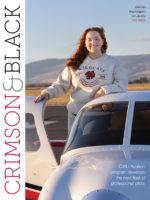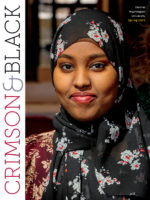Joe Tradii is no jamoke. He doesn’t carry a gat in his pocket, throw gloves at the drop of a hat, or squirt metal. What he does do is study language, particularly hard-boiled slang, the unique jargon that became popular in detective novels and films of the ‘20s, ‘30s, and ‘40s.
“I’ve always really enjoyed that language,” he said. “It’s just a fun language and idiom to speak.”
Tradii recently published “From Ameche to Zozzled: A Glossary of Hard-Boiled Slang of the 1920s through the 1940s,” a collection of words and phrases once common in the film noir/private eye pop culture of that era.
“Everyone seems to enjoy the language,” he said. “People can’t hear characters speaking hard-boiled language without smiling. It’s just fun—why say detective when you can say ‘gumshoe’ or gun when you can say ‘Roscoe.’
Tradii, a lecturer in the Department of Communications at Central Washington University who teaches public relations, advertising, and social media strategy, said hard-boiled slang never seems to fade away.
His 117-page book is filled with tough-guy (and tough dame) words and phrases such as: “know your onions,” meaning to know what’s going on; “butter and egg man,” which is the person who bankrolls a criminal activity; and “wooden kimono,” a term for a coffin. He said his favorite is probably “Kosher Nostra,” a term used to describe the Jewish mafia.
Tradii said he decided to write his book after he looked for a reference work on hard-boiled slang and found no one had written one.
Even the book’s title begs a reader to crack its cover to look up the terms. For the record, an “Ameche” is a telephone and is derived from the fact that actor Don Ameche played Alexander Graham Bell, inventor of the telephone, in a popular ’30 movie, while “zozzled” is another term for inebriated.
Tradii, who made his bones—a more recent gangster-type idiom—during more than 25 years working in the public relations, marketing, and advertising fields, said that during the two years, off-and-on he, spent researching the book he read “scores” of classic crime novels such as “The Maltese Falcon” and “Red Harvest” by Dashiell Hammett to more obscure works like “Build My Gallows High” by Geoffrey Holmes.

He also read dozens of short stories, pulp magazines, and newspaper articles, as well as viewed hundreds of hours of vintage, black-and-white genre films like “Double Indemnity,” “This Gun For Hire,” and “The Killers.”
“I watched everything from the really good stuff to the not-so-good,” he laughed.
So, who is his favorite writer? Tradii said he was most impressed by the works of one of the earliest practitioners of the noir-arts, Carroll John Daly, who has been called the father of hard-boiled detective with his character, Race Williams. Daly, who wrote for the influential “Black Mask” magazine, starting in the 1920s, crafted some 16 novels and dozens of short stories during his writing career. Tradii noted, “He’s still so contemporary.”
As for the language’s roots, Tradii said he spent a considerable time trying to ferret out the origins of hard-boiled slang. He points to the pulp magazines of the 1920s as among the first places it appeared in print.
“I think it started in the subcultures of the underworld,” he said. “Speaking it was almost like being in a club that marked you as a member of that club. I think it spread from the underworld to the newspapers and into popular culture . . . it was almost like having a secret handshake that made you a member of that club.”
Tradii, who now lives in North Bend with his wife, Cheryl, grew up in Detroit. He described the city as “still mobbed up when I grew up there.” In fact, his future goal is to write a detective novel set in Detroit.
He said one of the best things about writing his book is that he’s continuing to dig up new words, phrases, and anecdotes or have them suggested by others—so he plans to eventually produce a sequel.
Befitting someone who teaches social media strategy, Tradii also has a Facebook page, “Guys and Molls,” where he shares historic photos and snippets of gangster history.
“From Ameche to Zozzled: A Glossary of Hard-Boiled Slang of the 1920s through the 1940s” is available on Amazon.






comments powered by Disqus